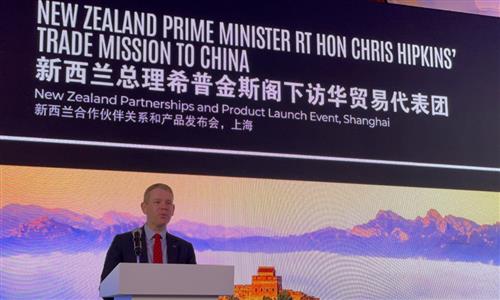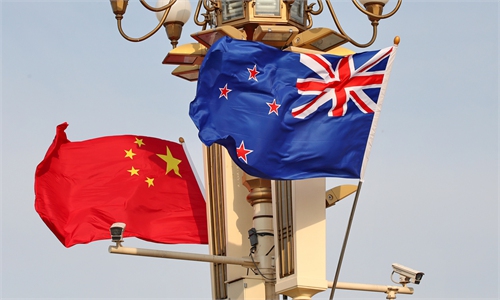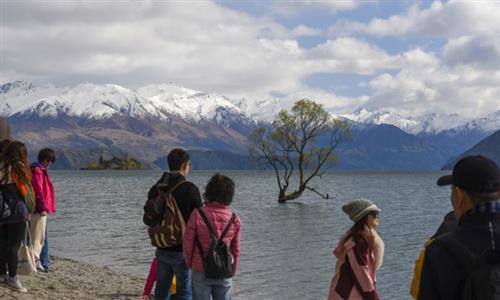GT Exclusive: China-New Zealand ties inject more certainty into the region, the world: Chinese envoy
China-New Zealand ties inject more certainty into the region, the world: Chinese envoy
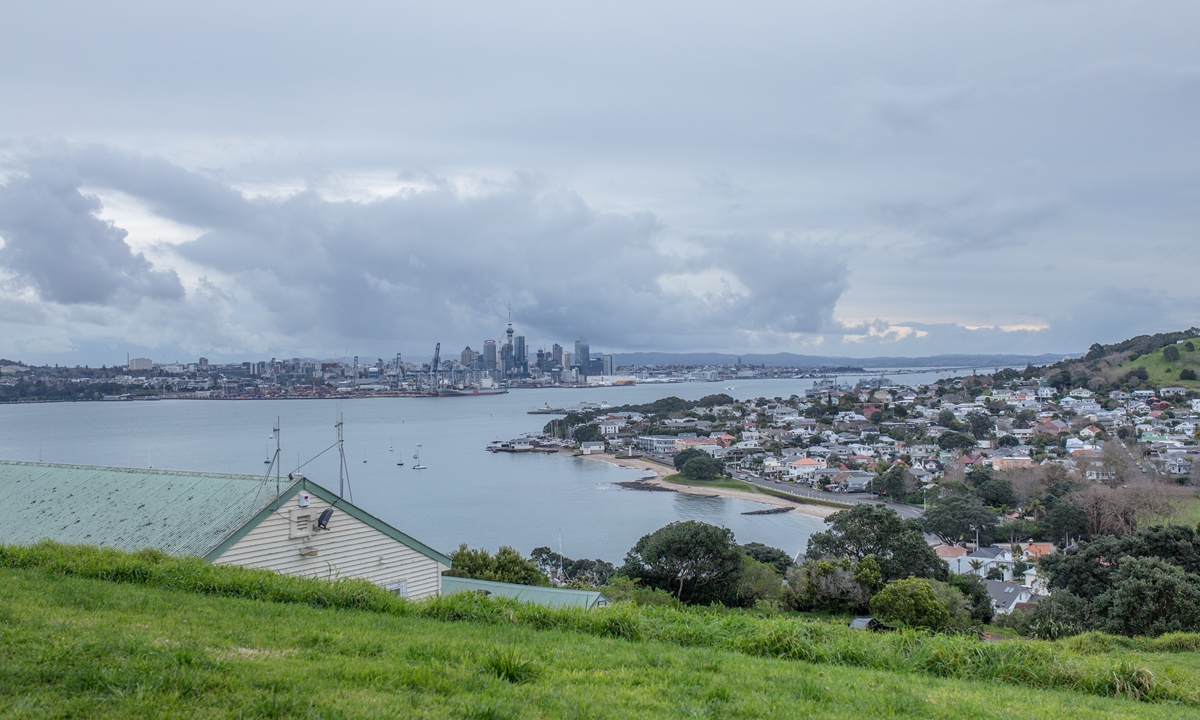
City view of Auckland, New Zealand Photo: Shan Jie/GT
Editor's Note: In March 2017, New Zealand became the first developed Western economy to sign a memorandum of understanding (MOU) on the Belt and Road Initiative (BRI). As the BRI celebrates its 10th anniversary, the Global Times recently conducted an interview with Chinese Ambassador to New Zealand Wang Xiaolong regarding cooperation under the BRI and development in bilateral ties.
Global Times: In your view, what are the positive implications of maintaining stable development in China-New Zealand relations?
Wang: China and New Zealand are comprehensive strategic partners. Over the years, the bilateral relationship has maintained a healthy and stable development momentum. This not only brings tangible benefits to the development of both countries and their people but also contributes to overall peace, stability, and prosperity internationally and regionally. During New Zealand Prime Minister Chris Hipkins' visit to China in June this year, the two sides reached broad consensus and issued a joint statement on the Comprehensive Strategic Partnership, which pointed the direction for our bilateral relationship.
Mutual benefit and win-win cooperation are the defining features of our practical cooperation. When I accompanied Prime Minister Hipkins on his visit to China, I witnessed first-hand how premium products and services from New Zealand are delivered to and enjoyed by Chinese consumers. Currently, under the strong leadership of the Communist Party of China, we are comprehensively advancing the Great Rejuvenation of the Chinese Nation on all fronts. New Zealand has unique advantages in areas such as the green economy, technological innovation, and creative industries. Deepening cooperation with New Zealand helps us achieve higher-quality development. Similarly, China is New Zealand's largest trading partner and export market. The growing bonds of practical cooperation between our two countries will serve as a significant driving force for New Zealand's post-pandemic economic recovery and bring vast opportunities for New Zealand's long-term economic and social development.
Looking forward to the future, peaceful development is a shared pursuit for both countries. China and New Zealand have extensive common interests in international and regional issues and are committed to promoting international cooperation to address global challenges. Both countries firmly support multilateralism, open regionalism, free trade, and the construction of an open world economy. We are staunch defenders of the UN-centered international system and the international order based on international law. We are committed to maintaining international and regional peace, stability, and development. In the context of a complex international situation, the stable development of China-New Zealand relations will inject more certainty into the region and the world at large.
2024 marks the 10th anniversary of the establishment of the Comprehensive Strategic Partnership between China and New Zealand. China looks forward to working hand in hand with New Zealand to strengthen high-level exchanges and political trust, deepen practical cooperation in various fields such as economy and trade, enhance people-to-people exchanges, deepen communication and cooperation on international and regional issues, and elevate the comprehensive strategic partnership between the two countries to a new level.
Global Times: In which areas do China and New Zealand share cooperation prospects, is there any data to illustrate the positive development of China-New Zealand cooperation?
Wang: China and New Zealand have highly complementary economies with deeply integrated interests, and economic and trade cooperation serves as a strong engine of China-New Zealand relations. Since the establishment of diplomatic relations in 1972, bilateral trade between the two sides has grown from NZ$7 million to over NZ$40 billion in 2022. It took six years for bilateral trade to reach NZ$20 billion, four years to reach NZ$30 billion, and only three years to reach NZ$40 billion. Currently, China has been New Zealand's largest trading partner in goods and largest export destination for ten consecutive years. From the signing of the Free Trade Agreement between China and New Zealand in 2008 to 2022, New Zealand's exports to China have grown at an annual rate of 17 percent, and bilateral trade volume has maintained a growth rate of over 10 percent per year. As both countries gradually recover from the COVID-19 pandemic, the enormous potential for economic and trade cooperation between the two countries will be further unleashed, bringing more tangible benefits to the people of both countries.
During Prime Minister Hipkins' visit to China in June this year, the two sides reached a number of consensus items on expanding cooperation on new fronts such as e-commerce, trade in services, green economy, etc., which provided strategic guidance to our bilateral economic and trade cooperation. We will work together with New Zealand to implement the consensus reached between the two leaders by expanding digital trade, aligning digital rules, enhancing cooperation in services trade such as tourism and education, holding dialogues on new-energy vehicles as soon as possible, strengthening cooperation on climate change, and exploring the possibilities of cooperation between China and New Zealand in building resilient infrastructure, among other initiatives.
Global Times: What kinds of cooperation have the two sides carried out under the MOU on the BRI and what results have been achieved?
Wang: New Zealand is the first Western developed country to sign a BRI cooperation document with China. The agreement was automatically renewed last year. In June this year, China and New Zealand stated in the Joint Statement on the Comprehensive Strategic Partnership that both sides agreed to maintain communication on BRI cooperation. Since the signing of relevant cooperation documents, China and New Zealand have been cooperating more closely in advancing policy, infrastructure, trade, financial and people-to-people connectivity. For example, the two countries have had frequent high-level exchanges. Not long ago, New Zealand Prime Minister Hipkins has led arguably the largest-ever delegation, trade or otherwise, to China. Recently, the Chinese Minister of Science and Technology and the Minister of Education have also led successful delegations to New Zealand.
Another example, when New Zealand was hit by Cyclone Gabrielle this year, improving infrastructure has become a consensus among all walks of life in New Zealand. And the business communities of China and New Zealand are paying close attention to this area and have begun to conduct in-depth discussions on bilateral infrastructure cooperation. Especially, in terms of trade, bilateral trade between China and New Zealand exceeded NZ$40 billion for the first time in 2022. The protocol of upgrading the Free Trade Agreement between China and New Zealand also officially came into effect in April last year, giving full play to the "ballast" and "stabilizer" role of practical economic and trade cooperation in China-New Zealand relations.
Looking into the future, China is willing to strengthen communication and coordination with New Zealand to carry out more pragmatic cooperation under the framework of the BRI to better benefit the two countries and their peoples.
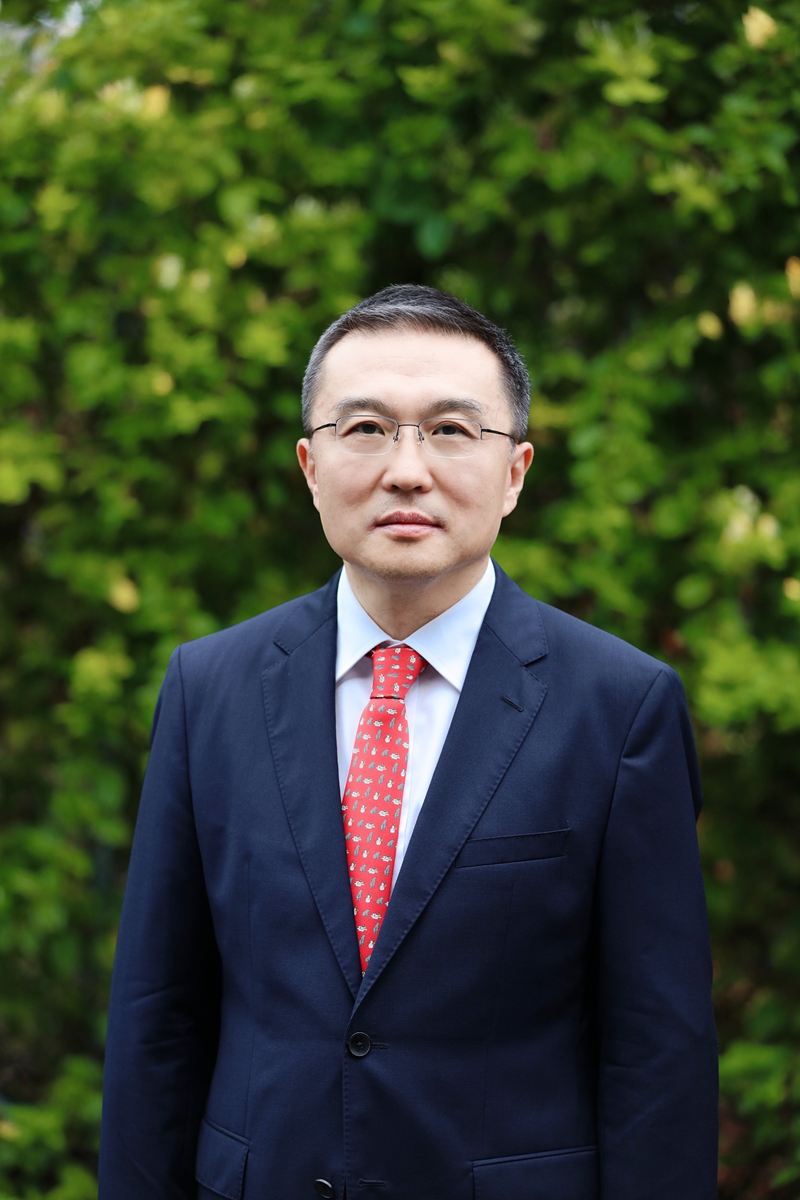
Chinese Ambassador to New Zealand Wang Xiaolong Photo: Courtesy of Chinese Embassy to New Zealand
Global Times: What do you think is the potential for cooperation between China and New Zealand in Asia-Pacific and South Pacific regional affairs?
Wang: As important countries in the Asia-Pacific region, China and New Zealand share extensive common interests and broad prospects for cooperation in the Asia-Pacific and South Pacific. In the Asia-Pacific region, China and New Zealand have carried out fruitful cooperation within the framework of the Regional Comprehensive Economic Partnership Agreement (RCEP), the Asia-Pacific Economic Cooperation Organization, the East Asia Summit and other frameworks, jointly promoted the process of building an Asia-Pacific Free Trade Area, and build an inclusive regional cooperation architecture. Open regionalism is a valuable experience from the Asia-Pacific's transformation into a region with the most vitality and growth potential in the world. China is willing to work with New Zealand to uphold true multilateralism, and maintain peace, stability, development and prosperity in the Asia-Pacific region to contribute to writing a new chapter of the Asia-Pacific miracle.
In recent years, the Comprehensive Strategic Partnership between China and Pacific Island Countries featuring mutual respect and common development has continued to move forward and achieved fruitful results, becoming a fine model of South-South cooperation, mutual benefit and win-win results. China has always been a trustworthy friend and a reliable brother of the Pacific Island countries. When developing relations with Pacific Island countries, China fully respects the sovereignty and independence of Pacific Island countries, fully respects the will of Pacific Island countries, fully respects the culture and traditions of Pacific Island countries, fully respects Pacific Island countries' effort to seek strength through unity, and fully respects the traditional ties and bonds among regional countries. China respects New Zealand's traditional connections and influence in the Pacific region, and is willing to strengthen policy communication and coordination with New Zealand, explore trilateral and multi-party cooperation on the basis of fully respecting the will of the Pacific Island countries, and provide genuine assistance to the Pacific Island countries in an effort to address common challenges, promote common development, and usher in a better future.
Global Times: How do you think the two sides should correctly view and address differences and promote the continuous development and progress of bilateral relations?
Wang: The China-New Zealand relationship has long spearheaded China's relations with developed countries and has become a successful example of win-win cooperation between countries with different social systems, histories, cultures, and development stages. The key is that China and New Zealand can respect each other, treat each other as equals, seek common ground while shelving differences, and never let differences define our bilateral relations or affect the overall mutually beneficial cooperation.
The development of China-New Zealand relations for more than half a century has fully demonstrated that the common interests of both sides far outweigh differences. We are each other's partners, not opponents, and we bring opportunities rather than threats to each other. As long as our two countries continue to uphold that spirit, achieve more "firsts," respect each other's core interests and major concerns, refrain from interfering in each other's internal affairs, conduct dialogue and consultation on the basis of equality, and enhance mutual trust, the two countries will be able to constructively manage and transcend our differences, so that the mutually beneficial nature of our bilateral relations will not change, and the momentum of healthy and stable development will be sustained.
